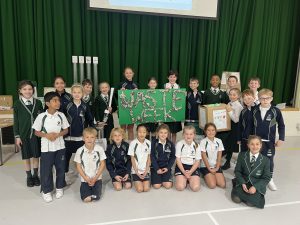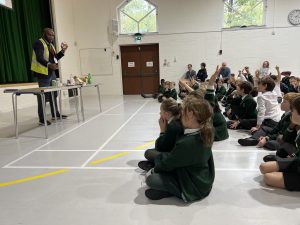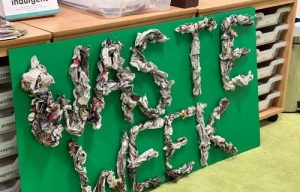As we aim to become an Eco School and live up to the “green” in our name, from 7th -11th November we focused our attention on waste output.
During ‘Waste Week’, the children and staff spoke with various members of our community to devise a plan to reduce our waste levels, ensure that we are recycling effectively and minimising our environmental impact. Speaking with our Head Chef, our Head Cleaner, our Estates Assistant and a local waste expert from Joint Waste Solutions, the children learned several ways in which they can help reduce waste. Here are their top five takeaways:
Keep all waste separate and avoid contamination.
Henry from Joint Waste solutions came in to speak with the children during their assembly and explained the process that recycled materials go through once they reach the recycling facility. Armed with an array of waste items you’d find at a school, Henry explained which items can be recycled, but also discussed the importance of de-contaminating these items before they go into the bin. For example, if a soft drink can, yoghurt pot or paint pot is not completely emptied, any spilled liquid will render all cardboard/paper items unrecyclable.
Only take what you can eat!
Our Head Chef Mr Stuart Kerr sat down with the children and discussed the food waste process and ideas for how we can reduce our waste output. Stuart explained that there are two main food waste components; leftover food at the service area, and food waste buckets in the dining room. The first category can be reused for teatime or frozen and reused for a different dish. The latter is collected by the council and therefore may be used for fertilizer, but there is a lot we can do to reduce the food waste in buckets. After chatting about the different reasons that children may waste food, one of the key points we can impress upon children is to only take what they can eat from the counters. We welcome children to take second helpings if they are still hungry, but we are introducing “quarter portions” that the children can ask for to control the amounts that are taken and avoid the old “eyes bigger than your belly” problem!
Separate bins for tricky items.
Our Head Cleaner spoke with teachers and children and explained how rubbish is collected and any areas that can be better managed to avoid unnecessary items going into the general waste. We are implementing new bins to combat the problem of “unusual” items including glue sticks and batteries that need additional processing before they can be recycled. The children have been particularly clued-up about these sorts of items after Year 6s completed their “Make A Difference” homework on unconventional waste items.
Spread awareness
With this type of initiative, it is vital that everyone involved is in the know. With over 300 children, they have the biggest footprint at school and can therefore be our best ambassadors for reducing waste and recycling correctly. We hosted a “bin label” competition, which every child participated in and winners were elected to proudly display their instructive posters on the many different bins that now occupy our dining room and classrooms. We also have been weighing the buckets of food waste every day so that the children have a real idea of the amount of waste, and how it all adds up at the end of every day. Moving forward our Future World Warriors will check back in with our food waste levels to see if we have been able to minimise the amount that’s thrown in the buckets every day at lunch. Watch this space!
Consistency
Our overhaul mission does not stop at Waste Week. Moving forward, we have reworked how rubbish and recycling are collected in every classroom, staff room and office. Keen Waste Monitors have been elected in each class who will oversee that the correct items are in the correct bins. With our ongoing weekly Future World Team Meetings, it is something that we will continue to revisit and keep in the forefront of the children’s minds to ensure that steps like these are second nature.







